Evolutionary Biology Laboratory
Science – 3rd Building – 2nd Floor
(Head of laboratory: Prof. Vincenzo Caputo Barucchi)
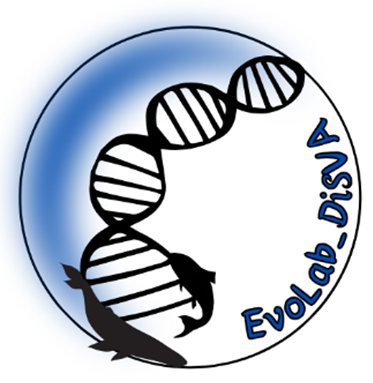 |
The Laboratory of Evolutionary Biology (EvoLab_DiSVA) investigates animal genetic diversity through the use of nuclear and mitochondrial molecular markers. Sampling activities, DNA extraction, PCR (Polymerase Chain Reaction) amplification, microsatellite genotyping, bioinformatic analysis of data from Sanger sequencing and NGS (Next Generation Sequencing) are carried out. The analyses are performed on marine and freshwater vertebrates of commercial and conservation interest in the Mediterranean area with the aim of clarifying their conservation status and promoting their correct management. The analysis of modern samples is often accompanied by the analysis of historical and ancient samples in order to directly highlight changes over time in the genetic diversity of natural populations caused by anthropogenic activities and past climate changes. |  |
Research Activity
- CONSERVATION GENETICS AND GENOMICS OF MEDITERRANEAN TROUT
-
The brown trout (Salmo trutta complex) is a native species in Europe, western Asia and in the Mediterranean basin. This species complex includes geographically distinct forms, which can interbreed, and which show a high phenotypic plasticity, in addition to an extraordinary genetic and ecological diversity. The survival of Mediterranean populations is seriously endangered by destruction of river habitats and hybridization with non-native trout introduced to support game fishing. EvoLab_DiSVA has been studying the evolution and genetic diversity of S. trutta for over twenty years, with the aim of providing useful indications for the conservation and correct management of Italian populations at serious risk of extinction. Objectives partly achieved thanks to the scientific coordination of an European project (LIFE12 NAT/IT/000940 “Trout Population Recovery in Central Italy”) and through several scientific collaboration with Italian public authorities.
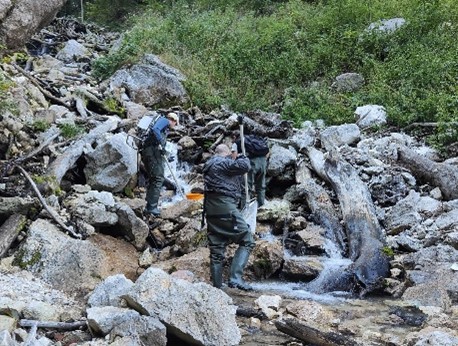
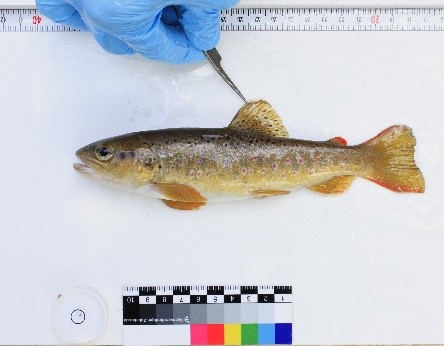
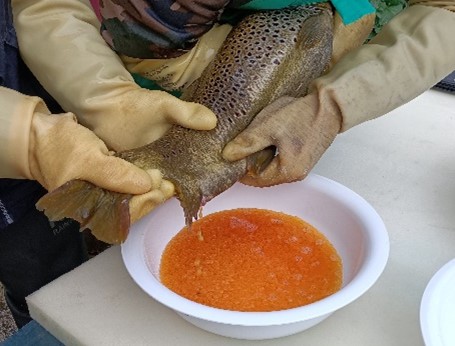
- GENETIC STOCK IDENTIFICATION IN FISH SPECIES OF COMMERCIAL INTEREST
-
Many species of Teleosts have suffered drastic population declines due to excessive and unregulated fishing activities, a phenomenon known as “overfishing”. The reduction in the size of natural populations can cause the loss of genetic variability (bottleneck), leading to a reduction in the reproductive and evolutionary potential of species. EvoLab_DiSVA has been carrying out genetic research on fish species of commercial interest for years, both on small (e.g. anchovy Engraulis encrasicolus and sardine Sardina pilchardus) and large pelagic fish (e.g. swordfish Xiphias gladius), with the aim of evaluating the genetic structure of populations and highlighting significant correlations between demographic fluctuations and genetic variability. These monitoring activities are important to define separate management units within species and to reveal the presence and effects of the overfishing
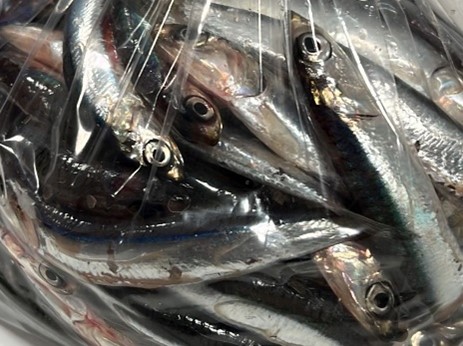
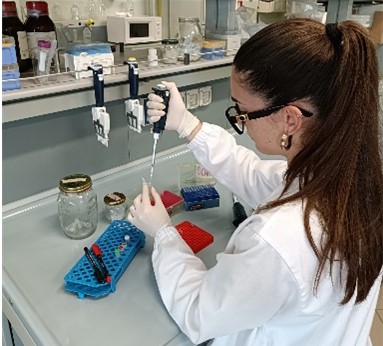
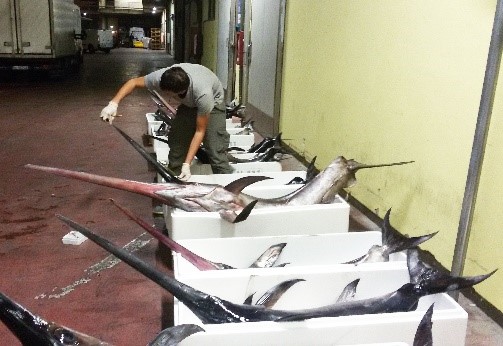
- GENETICS AND GENOMICS OF CETACEANS
-
Cetaceans play an important ecological role in marine ecosystems, both as apex predators and plankton consumers, and are of particular conservation interest as threatened by anthropogenic activities (e.g. by-catch, collisions with ships, chemical and acoustic pollution) and climate changes. EvoLab_DiSVA performs genetic and genomic analyses to monitor the conservation status of resident cetacean populations in the Mediterranean Sea and to reveal the identity and origin of individuals belonging to species that only occasionally visit this basin. Genetic analyses also allow to unveil cases of interspecific hybridization which, as suggested for the blue whale (Balaenoptera musculus), could lead to a decline in genetic diversity, increasing the extinction risk of involved species.
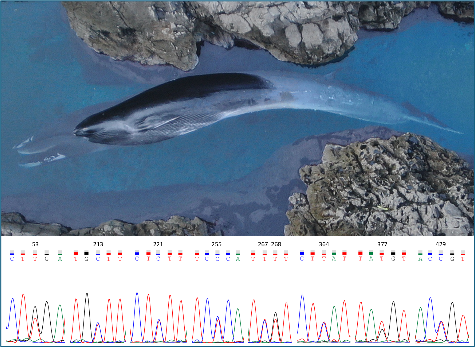
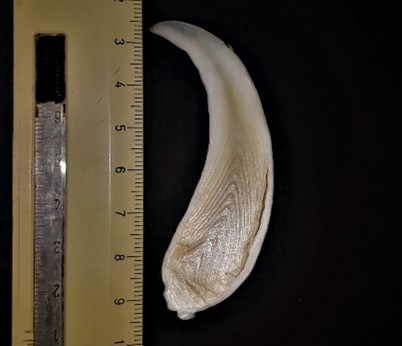
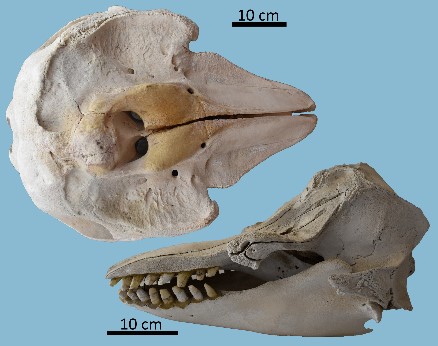
- ANCIENT AND HISTORICAL DNA
-
The EvoLab_DiSVA research group has a laboratory dedicated to the analysis of DNA from historical and ancient samples (e.g. taxidermied and formalinized specimens, bones and teeth from museum collections and archaeological excavations). The physical separation from the main laboratory, where analyses are performed on modern samples, allows the control of contamination by exogenous DNA to which historical/ancient DNA is often subject, being degraded into short fragments and present in reduced quantities in samples under examination. The analysis of samples from museum collections is particularly important for the genetic study of rare species and those difficult to sample in nature. Furthermore, the comparison of genetic data obtained from historical/ancient and modern samples allows us to highlight fluctuations in the genetic variability of species over time and identify their possible causes (anthropic activity vs. environmental changes).
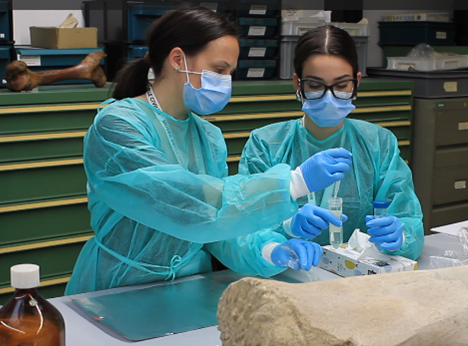
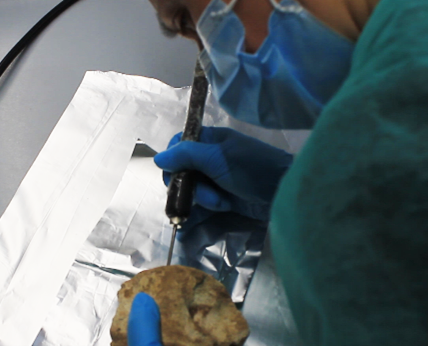
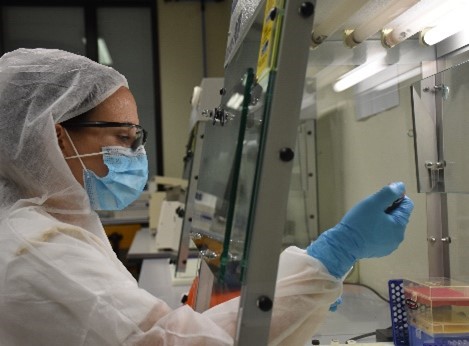
Il gruppo di ricerca può avvalersi di una stanza dedicata all’analisi del DNA da campioni storici e antichi (e.g. esemplari tassidermizzati e in formalina, ossa e denti da collezioni museali e scavi archeologici). La separazione fisica dal laboratorio principale, in cui si eseguono le analisi su campioni moderni, permette il controllo della contaminazione da DNA esogeno a cui è spesso soggetto il DNA storico/antico, essendo degradato in corti frammenti e presente in ridotta quantità nei campioni in esame.
- RESEARCH GRANTS AND AGREEMENTS
-
2024-2025: Research agreement with the “Città Metropolitana di Torino” as part of a cross-border project with France on the genetic monitoring of Mediterranean trout on the Italian-French border (Interreg VI ALCOTRA 21-27 – Progetto N. 20125 “Ge.co - Gestione Ecologica dei Conflitti” WP 3.1).
2023-2024: Research agreement with the Marche Region for the genetic monitoring of Mediterranean trout in the regional territory.
2020-2022: Project for the protection and management of genetic refuges of Mediterranean trout in Sardinia - registration no. 296 of 01.09.2020.
2020-2021: Research agreement renewal with the “Città Metropolitana di Torino” for the genetic monitoring of the western Alps populations of the genus Salmo.
2019: Assignment by the Gran Paradiso National Park Authority of a service for genetic analyses on marble trout samples.
2018-2020: Research agreement with the “Città Metropolitana di Torino” for the genetic monitoring of the Western Alps populations of the genus Salmo.
2018: Agreement with the Cuneo Province for performing genetic analyses on brown trout samples from the Western Alps.
2017: Agreement with the Museum of Civilizations of Rome on “Ancient DNA, evolution of Mediterranean Salmonids, paleoclimatology, Quaternary paleontology, archaeozoology and pedology”.
2017: Assignment by the Managment Authority of the Monviso protected areas for performing genetic analyses on Salmo trutta samples collected in the National Park and in neighboring areas of the south-western Alps.
2016: University strategic project “Integrating approaches (ancient DNA, climate stratigraphy, pedology) to open a window on the past: the case of prehistoric trout in the Mediterranean basin during the great climatic change across Pleistocene and Holocene”.
2016-2020: Agreement for the collaboration between the Umbria Region, the Department of Chemistry, Biology and Biotechnology of the University of Perugia and the Department of Life and Environmental Sciences of the Marche Polytechnic University for the study of the fish fauna of the Tiber river basin and for the research, selection and production of Mediterranean trout for re-stocking activities.
2016: Agreement for the implementation of the project "drafting a report about fish species in freshwater of Sardinia with particular reference to areas characterized by the presence of genetically pure populations of the Sardinian trout (Salmo cettii ex Salmo trutta macrostigma), a native species of Sardinia at serious risk of extinction" .
2013-2017: LIFE-NATURA 2012, PROPOSAL LIFE12 NAT/IT/000940 "Trout Population Recovery in Central Italy".
2013: Agreement with the Monti Sibillini National Park, "urgent measures for the protection of the white-clawed crayfish (Austropotamobius pallipes)".
2013: Research agreement with the Terni Province: “selection, recovery and conservation of the native Mediterranean strain of brown trout (Salmo ghigii pomini, 1941) in the Nera river basin”.
2012: RITMARE project, responsible for research units (SP2_WP1_AZ4_UO02, the genetic structure of anchovy stocks, Engraulis sp., in the Adriatic Sea).
2011: PRIN2009, sex determination in squamate reptiles: chromosomal and molecular issues.
2010: Agreement with the association “Museum System of the province of Ancona” with the aim to collaborate for the research: “biodiversity of the Marche Region documented by the Zoological collection of the Museum of Natural Sciences “Luigi Paolucci” of Offagna.
2009: Agreement with the Pesaro and Urbino Province for the research conducted within the project "genetic screening for the planning of "supportive breeding" activities in populations of brown trout (Salmo trutta l. complex) in streams of the province of Pesaro and Urbino".
2008: Agreement with the Ancona Province for the research conducted within the project "genetic screening on brown trout populations (Salmo trutta l. 1758) in the province of Ancona".
2006: Research agreement with the company “ASTERIA srl” on the project “TRUENTUM FLUMEN, actions for the knowledge and biodiversity of the Tronto river”.
- Equipment
-
Magnetic stirrer with hot plate ArgoLab M2-A
Orbital shaker IKA KS 260 basic
Vortex mixer ArgoLab Mix
Autoclave ASAL 760
Vertical gel electrophoresis units Bio-Rad Sequi-Gen cell and Biometra Model S2
Digital heated circulating bath Grant TC120
Dubnoff shaking water bath ASAL 740
Analytical balance Radwag AS160.2
Laboratory hoods (fume hood and laminar flow hood)
PCR cabinets AURA PCR
Submerged horizontal electrophoresis cells Mini-Sub Cell GT Cell and Wide Mini-Sub Cell GT Cell
Centrifuges Eppendorf MiniSpin, Eppendorf Centrifuge 5424R and ALC Centrifuge 4235A
Automated Nucleic Acid Extractor Magcore HF16
Fluorimetro Promega Quantus
Generatori Bio-Rad powerpack 3000, Bio-Rad Powerpack HC, Bio-Rad Powerpack HV
Epi-Fluorescence Microscopes
Microtome
Eppendorf ThermoMixer C with heated lid Eppendorf Thermotop and thermoblocks Eppendorf Smartblocks 2.0-1.5-0.2 ml
Thermal Cyclers for PCR Bio-Rad T100
UV Transilluminator Moonlight with camera for image acquisition and software for image analysis
Staff
|
Prof. Vincenzo Caputo Barucchi https://orcid.org/0000-0002-4427-3129 Master’s Degree in Natural Sciences and PhD in Evolutionary Biology. He is a Full Professor of Comparative Anatomy at the Department of Life and Environmental Sciences, where he teaches "Comparative Anatomy" (Bachelor's Degree in Biological Sciences) and "Evolutionary Biology of marine Vertebrates” (Master's degree in Marine Biology). He carried out faunal researches in the Mediterranean area (Southern Europe and North Africa) and participated in the XIV and XVII Italian Antarctic Research Expedition. During these investigations he had the opportunity to discover some species of vertebrates new to Science. Currently, his research interests concern the conservation biology of marine and freshwater vertebrates and the study of ancient DNA obtained from museum and archaeological specimens. |
 |
|
Dr. Andrea Splendiani Master's Degree in "Marine Biology" and PhD in "Marine Biology and Ecology" at the Department of Life and Environmental Sciences (UNIVPM). Expert in the genotyping of vertebrate species and populations (with particular regard to teleost fish) through mitochondrial and nuclear markers and in data processing through the use of proper statistical packages. Author and co-author of numerous peer-reviewed international publications; board of director member of the Italian Association of Freshwater Ichthyologists; Associate Editor of “The European Zoological Journal”. |
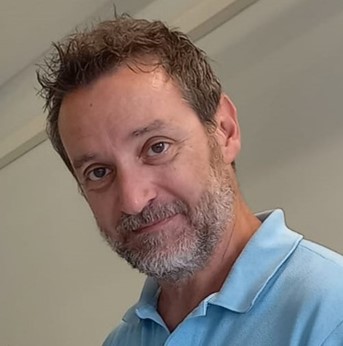 |
|
Dr. Tatiana Fioravanti Master’s Degree in Marine Biology and Ph.D. in Marine Biology and Ecology. Expert in the field of population genetics of freshwater and marine vertebrates, and specialized in the analysis of DNA from ancient and historical samples. Author and co-author of numerous peer-reviewed international publications. |
 |
|
Dr. Lucrezia Latini PhD student of the XXXIX cycle of the PhD course in Life and Environmental Sciences (curriculum Marine Biology and Ecology). Master’s degree in Marine Biology with a research thesis on genetics of Mediterranean Cetaceans and skeletrochronological analysis for their age estimation. |
 |

